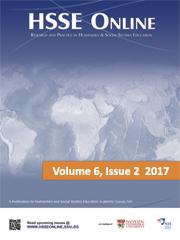What is Social Studies?
Susan Adler (University of Missouri-Kansas City) Kho Ee Moi (National Institute of Education, Singapore) Keywords Primary Social Studies Primary School Primary Social Studies Abstract This paper explores

HSSE Online EDITORIAL
This special edition of primary social studies for HSSE Online focuses on the what, the why and the how of social studies education for primary students. The driving force behind this issue stems from the deep conviction of the primary social studies teacher educators in HSSE that the subject must be taught meaningfully and powerfully in schools for effective citizenship education. Meaningful and powerful teaching is necessary for our young to gain relevant knowledge and understandings of Singapore and the world, acquire essential skills and develop civic-minded values and dispositions to be informed, concerned and participative citizens. Such citizens are invaluable to the health and development of any society as they seek to exercise their agency in their varied spheres of influence to make a difference to others in the society and the complex world around them. Furthermore, social studies is the only humanities subject in the primary school curriculum and teaching it well would provide an excellent foundation for students’ further study of the humanities subjects, namely history, geography and social studies, when they proceed to secondary schools. The humanities offers us a way to understand ourselves as human beings, and the issues and challenges which we encounter in our interactions with others in myriad contexts. It benefits us through examining critical issues using multiple and varied lenses, through discourses amongst various communities and fostering critical reasoning about human values and traditions.
In this issue, the nine articles, organized around three themes, are included to support teachers in teaching primary social studies meaningfully and powerfully. The first theme focuses on what is social studies in general, and Singapore social studies in particular. The second theme revolves around what to teach in primary social studies and how to teach it. The final theme is on how to organize students for effective group learning of primary social studies in a social constructivist classroom.
Under the first theme, the article by Susan Adler and Kho Ee Moi explores the nature and purpose of social studies for citizenship education with the aim of showing the relevance and importance of teaching the subject well. They discuss teachers’ orientations towards the subject and highlight some key knowledge, skills and values essential to developing young people to become informed, concerned and participative citizens and provide some examples of what effective lessons may look like. The next article by Kho Ee Moi focuses on social studies as citizenship education in Singapore. Her article examines how social studies in Singapore has evolved over the years from “moulding” citizens to developing critical thinkers.
Under the second theme, the article by Susan Adler and Kho Ee Moi discusses how teachers can enhance student understanding through planning instruction around big ideas which refer to the key concepts and generalizations that underpin the curriculum. Under the same theme, Doreen Tan and Sim Hwee Hwang examine what is history and geography respectively and suggest how the core concepts and skills in these two disciplines can be taught in the primary social studies classroom. Also under the same theme, Sim Hwee Hwang highlights the power of stories in teaching social studies effectively and elaborates on three teaching approaches, namely, the shared book approach, the integrated biographical inquiry and storytelling, for integrating stories in class. Chua Shuyi extends on the power of stories and storytelling in the classroom by showcasing four stories told in secondary classrooms to illustrate the possible variety of purposes of storytelling. Although these stories were observed in secondary classrooms, Shuyi shows how these can have applications in primary social studies as well.
Under the third theme, Sim Hwee Hwang and P. Ananthi point out that putting children into groups does not necessarily guarantee that productive and meaningful learning will take place. They argue that it is important to structure the elements of cooperative learning into the group activities. In their first article on cooperative learning, they describe the key principles, structures and benefits of cooperative learning, and illustrate with some classroom examples to show how the integration of cooperative learning can be achieved. In their second article, they elaborate on how to plan, organize and conduct productive cooperative learning for teaching primary social studies. Suggestions on how to manage challenging student behaviours for successful cooperative learning and the assessment and reflection of such lessons are also highlighted.
Sim Hwee Hwang
Chee Min Fui
Kho Ee Moi
Editors, HSSE Online
Susan Adler (University of Missouri-Kansas City) Kho Ee Moi (National Institute of Education, Singapore) Keywords Primary Social Studies Primary School Primary Social Studies Abstract This paper explores
Kho Ee Moi (National Institute of Education, Singapore) Keywords Primary Social Studies Social Studies Introduction Most educators in democratic societies agree that developing the young to
Susan Adler (University of Missouri-Kansas City) Kho Ee Moi (National Institute of Education, Singapore) Keywords Primary Social Studies Primary Social Studies Introduction Ms. Lee began the school
H Doreen Tan (Singapore International School (Hong Kong)) Keywords Primary Social Studies Primary School Primary Social Studies Abstract This article looks at the nature of history
Sim Hwee Hwang (National Institute of Education, Singapore) Keywords Primary Social Studies Primary School Primary Social Studies Abstract Geography is a subject that helps children understand
Sim Hwee Hwang (National Institute of Education, Singapore) Keywords Primary Social Studies Primary School Primary Social Studies Abstract Stories are often used by teachers to transmit
Copyright Sustainability Learning Lab 2022 – All Rights Reserved